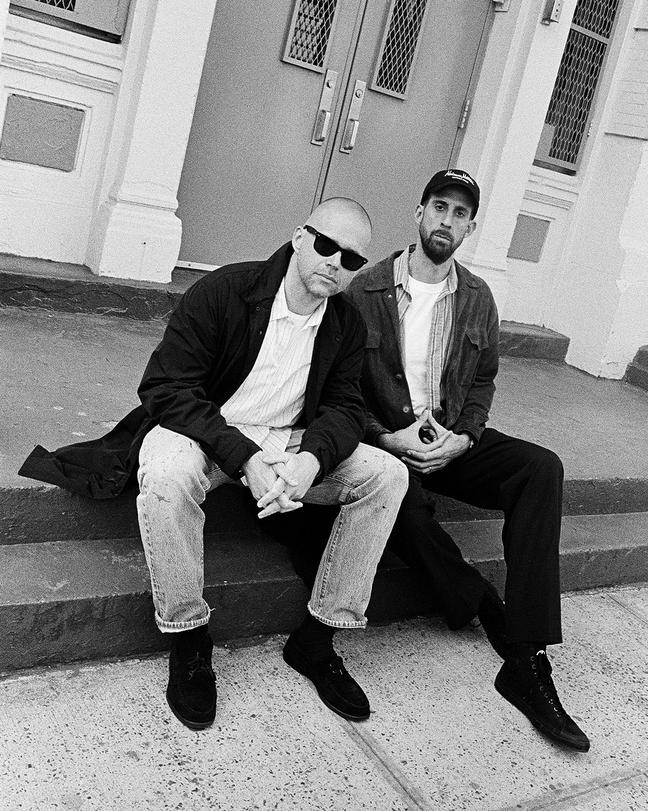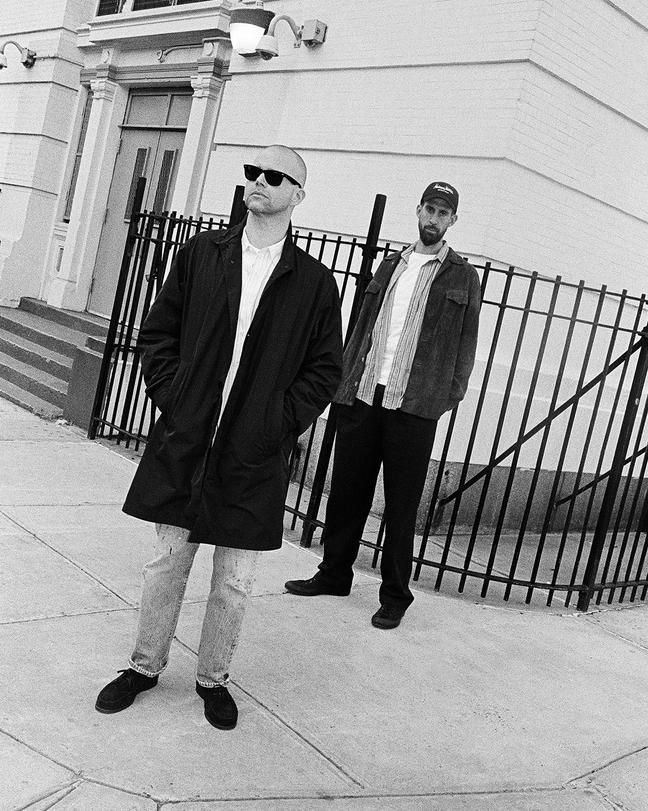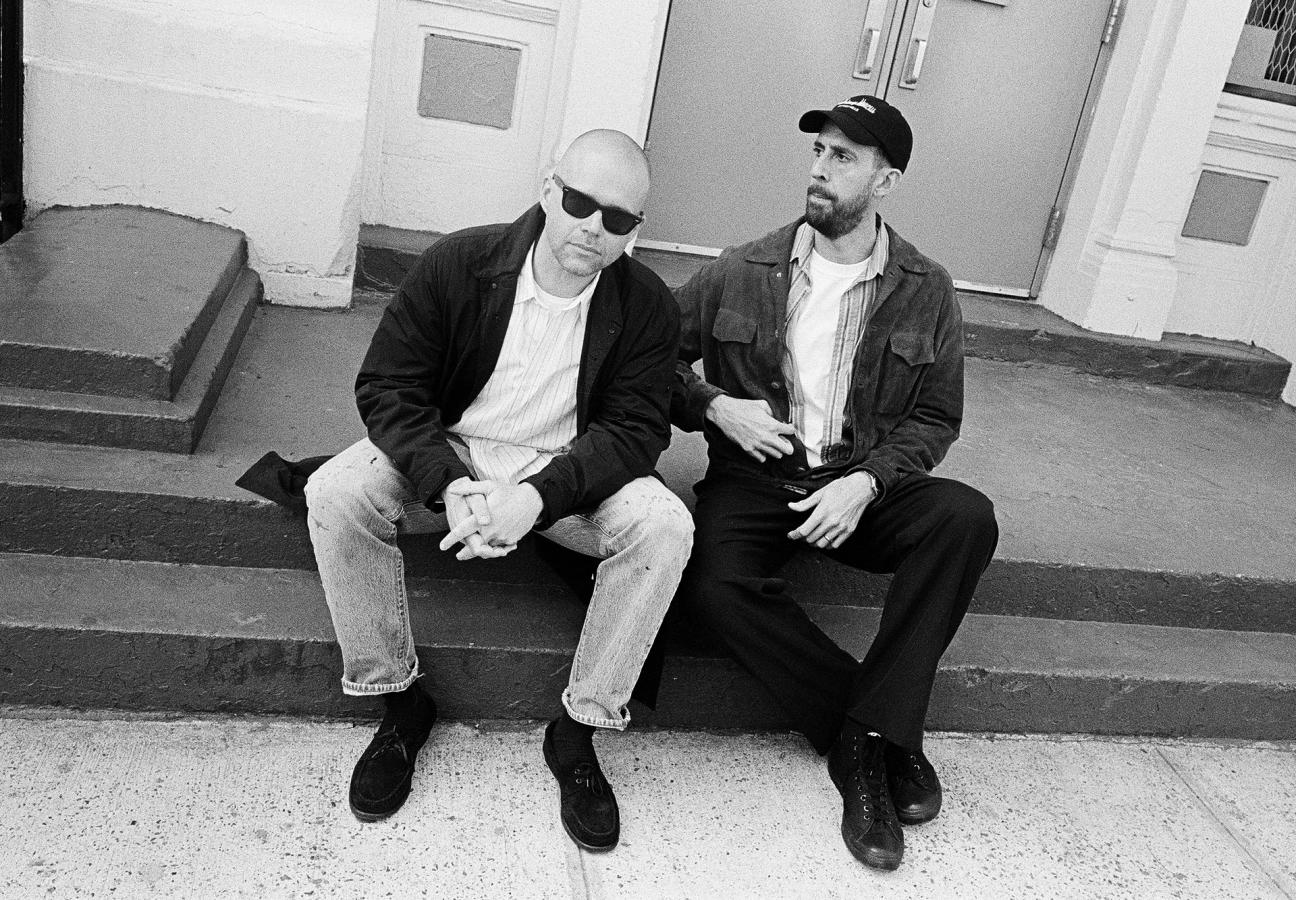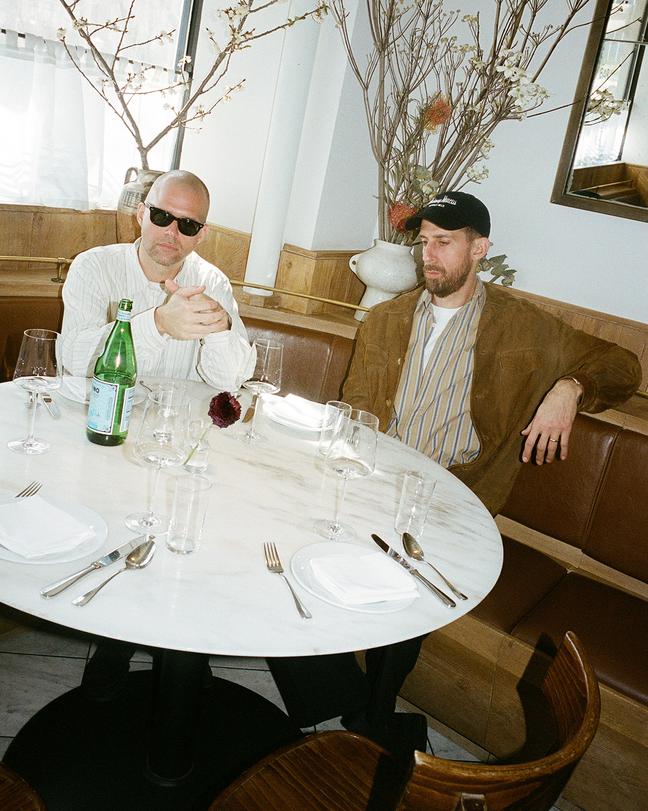How Long Gone: Your favourite podcaster’s favourite podcasters
In 2024, ‘Two white guys with a podcast’ is no longer a pitch — it’s a punchline. But Chris Black and Jason Stewart, co-hosts of How Long Gone, are having the last laugh
When young men like me say to each other, over a second pack of Marlboro Golds on someone else's balcony at 3 AM, the immortal sentence: 'hey, we should start a podcast together', it's because they hope one day to sound like Chris Black and Jason Stewart. Even if they’ve never heard of Chris Black and Jason Stewart, nor listened to their very popular podcast How Long Gone, they’d probably still hope to sound like them. Theirs is the platonic ideal of a certain kind of podcasting. Podcasting as it should have been. Podcasting as it once was. Podcasting before the gimmicks (“Each week I ask a celebrity friend to tell me about their favourite dead pet!”) or the supplement cash-grabs. (Though one senses there is probably some cash about these days — McDonalds is a big-name sponsor of the show.)
The pitch for the self-described ‘bi-coastal elite podcast’, released three times a week with admirable discipline, is bafflingly simple. Chris and Jason just sort of talk to each other. Sometimes they talk to a guest who is also often a friend or a friend-of-a-friend. Often these people work in music or media. Guests include people like Mark Ronson, Suki Waterhouse, Moby and Graydon Carter. There doesn’t seem to have been much research done, and no-one feels the need to say ‘wherever you get your podcasts’ or open up about their gut health. There is no spicy chicken, nor any talk about how the whole cast and crew was so unbelievably talented. You’d call it the anti-podcast if it wasn’t such a classic podcast; if it wasn’t like podcasts were back in the day, before they got so, well, podcast-y. Before every celebrity and their personal trainer thought they might be the next Johnny Carson and snaffle up some of that sweet, sweet Huel money while they were at it. I hate podcasts now, and I’m supposed to host one. I love How Long Gone. I just couldn’t tell you exactly why.
The show started during the pandemic as a socially-distanced catch up between two old friends: Chris Black, who is a consultant to fashion brands like Thom Browne and has a style column for New York magazine; and Jason Stewart, a beloved party DJ by the name ‘Them Jeans’ who’s had several cultish podcasts in the past. It’s now on episode 668, and racks up 500,000 downloads a month. Not that the numbers really matter. Brian Eno once said that only 30,000 people ever bought the Velvet Underground’s first record, but that “every single one of those 30,000 people went on to start a band.” How Long Gone sort of feels like that. Its guests are its core listeners, and vice versa. It is your favourite podcaster's favourite podcaster’s favourite podcast. And while that means it’s spawned some inevitable, irksome imitators (we’ll get to that), it gives the listening experience a unique tone: a sort of scene-y, if you know, you know insiderness. The kids in the cafeteria who appeal to both the jocks and the band geeks. Ferris Bueller FM. All descriptions, by the way, that Chris and Jason would no doubt have some pretty strong opinions on. The other mark of the show is the unfettered hot-takes and take-downs that How Long Gone sprays out. The pair have exacting tastes, and are funny with them, too. There is a lot of assumed, in-depth knowledge and contrarian views, mainly about restaurants and fashion brands and micro-scenes. It has the quality of eavesdropping on a gossipy, long lunch. So much of the podcast charts has become so slick, so sanitised, so inoffensive and bland on the one hand — or so blow-hard, so conspiracy-theoried, so red-pilly on the other. It’s nice to listen to something in the jolly middle; something that sounds like people actually sound. Or that sounds, at least, like they sometimes hope they sound.
I spoke to Chris and Jason over a transatlantic Zoom call in late March (Jason was in LA, Chris was in New York) and started by asking them what they thought about London as a city. In representative How Long Gone fashion, they sort of took it from there.


Chris: London is the only city I could live in outside of America, and we go every chance we get. The food still sucks, but I’ll find a way to power through.
Jason: I probably agree with Chris, but mostly because they speak English there, so that makes it easier. But, yeah. You go meet Rory for a natural wine, and you’re walking home and having a cig, and you’re like, “I could live in this neighbourhood. We should live in this neighbourhood.” And we don’t say that in Italy.
Joe: People always describe you guys as Anglophiles. How do you feel about that?
Jason: We probably got into it through Britpop music in the late nineties.
Chris: Music, for sure. What else are you guys giving us besides, you know, the royal family, which we don’t really care about until now because Kate’s dead? But the music stuff is number one for sure. That’s how anyone becomes an Anglophile. I like Guy Ritchie, but you know, not that much.
Jason: Yeah. Lock, Stock and Two Smoking Barrels didn’t change my life. But yeah, in the nineties, when Chris and I were impressionable teens, Oasis, Blur, Pulp, all these bands were so cool and so big, and you would watch Quadrophenia and Clockwork Orange and everyone in them is this cool person, and it was long before Fred Perry was racist. And you’ve got a scooter and you’ve got a girlfriend on it whose head is shaved except for her bangs.
Chris: I mean, honestly, you guys do rock stars better than we do. You guys had Oasis and Stone Roses and Blur and Pulp and we had Stone Temple Pilots and Bush. You know what I mean? It’s not like they didn’t have big songs, but they didn’t have any swag. It didn’t have a style to it.
Joe: You guys are sort of an anti-format podcast. Everyone feels the need to have a gimmick now, but you are gimmick-less. Do you think about formats a lot? Do you think we are in an era where everything’s got to have a thing?
Chris: I find it to be limiting. We talk about this a lot. You see these shows launch and they have some dumb premise. You’re like: why are you doing this to yourself? It might make it easier at the beginning, but it will make it harder in the long run. It just doesn’t make sense to me. If you can have a conversation, you don’t need a schtick.
Jason: If you’re really good at riding your bicycle, training wheels are only going to slow you down. It’s not going to help you out. But yeah, like Chris said, it’s a good way to get the convo going and get the ball rolling. But I’ve always looked down upon it in some ways. Like Jimmy Fallon has to play Twister with his guests because they’re not good enough at talking to keep my attention for 10 minutes.
Joe: A big part of the success of the show is the fact that you guys have very exacting taste, and that you can articulate that taste in interesting ways. I was listening to a podcast the other day, and someone was talking about how, because of AI mediocrity, we’re entering this new ‘taste economy,’ where people’s taste is going to be the only thing that sets them apart. Can you see that being a thing?
Chris: I mean, that would benefit us! But no, I think that taste is obviously relative. We all think we have great taste, whether we do or not. So I think about it more in terms of point of view than taste. I think that’s what we have. It’s really kind of our own point of view, and it’s based on our lived experiences and what we’ve done and what we haven’t done.
Jason: Hopefully taste and point of view are things that you cannot duplicate with AI. Because it’s difficult to have a point of view. You have to put yourself on the line and be open for criticism and ridicule. But Chris and I, since we’re a little bit older, we come from a generation where, when we were developing our tastes, we had friends who would very clearly tell us when we were wrong.
You know, nowadays you listen to somebody be like: ‘Those pants are cool for you and I respect that and your journey and blah blah,’ but we come from a generation where they’d say ‘your pants are stupid, take them off.’ And then you’re like, ‘Okay, now I know I shouldn’t wear these stupid pants,’ and that helps develop your taste.

Joe: Do you guys feel in touch with younger generations? Do you understand what’s going on in their subcultures?
Jason: I think it’s part of our job to know what young people are doing and thinking, what they’re listening to and watching. But as you get older, the ability to do that gets tougher and tougher. Most people, they become set in their ways and they stop checking for new stuff in their early 30s when they settle down and have kids.
But I think you have to really pick your battles and you have to know that this is a thing that has potential, it has legs. I’m going to keep my eye on it. I think it’s going to be something, you know — it’s just like a stock or something, an investment that you believe in. And then there are so many other things that young people are doing where you’re like: I do not need to devote a single ounce of brain power to this. Like, I am completely out.
Joe: What sort of things do you see in the culture that you think are completely overrated?
Chris: Where do you want me to start? Almost everything!
Jason: Matcha!
Chris: Yeah, Matcha is awful. But Taylor Swift is a great example where it’s like, I know she has hits, but I really don’t understand the rabid dedication. And I also think that there’s no shame anymore. No one’s ashamed to be a fan and be pathetic and wait in line. It’s crazy. I like things a lot and I’m happy to talk about them. But this kind of worship, this stan culture thing, it’s really tough. And I think it’s bad for society.
Joe: What else do you see in that category alongside Taylor Swift?
Chris: We got Taylor Swift. We got Frank Ocean. We got Balenciaga. I mean, there’s so much. But I also think that as you get older you realise, ‘Oh, that’s just not for me.’ And that’s maturity. Being able to think: ‘ I think this is awful, but I can look at it and understand why people like it.’ And that feels like a more reasonable place to reside.
Joe: In the last couple of years we’ve seen a huge amount of celebrities start their own podcasts, often in which they just interview their celebrity friends. How do you feel about that trend?
Jason: It’s much like the advent of celebrity DJing. You look at something like podcasting and think: ‘that seems very easy. I could do that. I’m famous. People will want to watch me just based on how famous I am.’ Sometimes it works out. Sometimes it doesn’t. It usually doesn’t work out, thankfully. And that’s the thing I like about podcasting. The cream does rise to the top. And if you are super famous, if your show is bad, it’s not going to get picked up for another season.
And we see that happening now. All the budgets that were being given out to these celebs for their shows are being cancelled and moved to other places. Not to our bank accounts quite yet…
Chris: It’s just part of an overarching trend, I think, where celebrities are afraid to be vulnerable and be open to real questions or conversations. It’s the same reason why, you know, a Beyoncé magazine cover will just feature an essay that she wrote instead of an interview with a journalist.
If I’m a celebrity and I go to Dax Shepard’s house, I know that Dax Shepard is not going to throw me under the bus. If I go on ‘Smartless’ [Jason Bateman, Sean Hayes, and Will Arnett’s podcast] with fucking Tweedledee and Tweedledum, then I know that it’s going to be fine because they are under the same spotlight I’m under. So it makes sense. But I think that an informed listener would know that it’s kind of a sanitised conversation.
Joe: Your own style is deceptively hard to replicate. Have you noticed people trying to imitate How Long Gone?
Jason: There’s probably five or six podcasts that I am aware of that do that. A couple of them, Chris and I have probably been a guest on at some point. And you could tell that they used us as inspiration to start their podcast. And that’s fine. I think that’s good for us. If you’re an emerging musician, the first song you play with your band is probably going to be a cover of an old band that you like. And then you’re going to remix a song that you like. And you’re eventually going to be able to find your voice on your own.

Joe: Have you ever really not got on with a guest?
Jason: No.
Chris: Jason and I say this all the time. It’s like, we’re going to do this whether you’re here or not. So you can either get with the program or you can be a fucking bump on the log. But either way, this is coming out tomorrow because that’s how we do this.
Jason: We’re getting the ball in the net. You can give us an assist if you want. You can get on the scoreboard with us if you want. But the clock is going to strike 90 and we’re going to get a goal. However you want to do it.
Chris: And you often see people, for the first 10 or 15 minutes, just looking at you with complete disdain and confusion. And then something happens where they’re like, oh, I get what this is. And then they snap into it and it becomes great. And that happens all the time. Mostly older guests who’re not aware of it at all.
Jason: Or the opposite will happen, where you get a guest who’s in the middle of a press tour. This is their third podcast of the day. And the rest have been full of awful questions and super boring. And then they hop on with us. And within five minutes, they’re like, ‘Oh, so you guys just bullshit and play around. Oh, thank fucking God. I can’t answer another question about my process. I would love to just talk about how my smoke detector keeps beeping and what kind of milk you drink. That sounds so nice right now.’
Joe: I’ve been looking back at a lot of the early coverage you guys got in 2020 and 2021, often from big titles. The general tone of the articles was: ‘What’s going on here? Why is this so popular?’ They couldn’t quite work it out…
Jason: Yeah: ‘Why am I listening to these bros talking on a podcast?’
Chris: The attitude was definitely: ‘I don’t want to like this, but I do.’
Jason: Yes. ‘Despite everything.’
Chris: ‘Despite everything. These guys seem awful, but I cannot stop.’ I mean, look, I don’t give a shit. As long as you listen, I don’t care if you hate me or not. It’s a free-will activity. We don’t charge you for this, so if you don’t like it, fuck off. It’s fine. It’s not that big. And if you do like it, we give it to you for free. Buy a ticket. Come see us play. We’ll make it fun for you.
Joe: One of the other things that I noticed in that press coverage was the sense that this was a novel way of observing masculinity. Two male friends talking fairly normally and openly to each other. Do you have a take on that?
Jason: It’s something that I have thought about since we started the podcast. And I think that every person is fucked up in their own ways. Nobody is perfect. They have their flaws. They have their mental illnesses. They have their things that are going on in their life. And that makes them a type of person that could find it hard to have relationships with other people. And all we’re doing is showing that we’re also this kind of fucked up and this kind of good. Here’s an example of two male friends who are just talking to each other. And you can hurt each other’s feelings in a playful way and live to fight another day. You could say something that is nice and it’s not weird. You can say something that’s really hurtful, but in a funny way that nobody’s getting triggered and traumatised.
It’s just showing people: here’s how you can play with each other. Here’s how you can interact with each other. The good and the bad.
Chris: I think that people think of men as, you know, either guys who want to watch football with their friends and hate their wives, or guys that are overly sensitive that like to keep a paperback in their back pocket.
Jason: But the reality is, it’s not a two-party system.
Chris: Most people are in the middle somewhere.
Jason: Yeah, the sweet spot is being a pussy while calling other people pussies.
Chris: It really is. That’s it. We’ve mastered that. If nothing else, we’ve mastered that.
For more culture recommendations, check out our pick of the best shows to watch on Netflix this month...

Become a Gentleman’s Journal Member?
Like the Gentleman’s Journal? Why not join the Clubhouse, a special kind of private club where members receive offers and experiences from hand-picked, premium brands. You will also receive invites to exclusive events, the quarterly print magazine delivered directly to your door and your own membership card.


